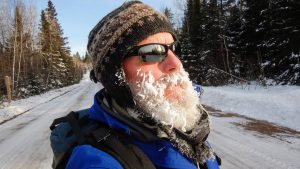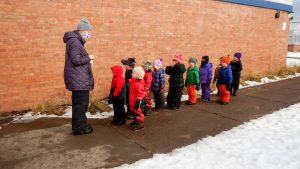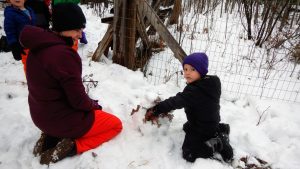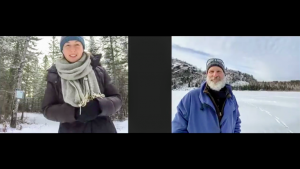Partnerships in the Pandemic Spotlight: Wolf Ridge Environmental Learning Center
by Cristina Edwards and Emilie Lygren
 Joe Walewski is the Director of Naturalist Training at Wolf Ridge Environmental Learning Center on the North Shore of Lake Superior in Finland, Minnesota. We spoke with Joe about the ways his organization has partnered with two local charter schools to offer outdoor, in-person education during the pandemic. These partnerships emerged from existing relationships, and a strong desire from school administrators and families to be able to provide outdoor learning opportunities for their students.
Joe Walewski is the Director of Naturalist Training at Wolf Ridge Environmental Learning Center on the North Shore of Lake Superior in Finland, Minnesota. We spoke with Joe about the ways his organization has partnered with two local charter schools to offer outdoor, in-person education during the pandemic. These partnerships emerged from existing relationships, and a strong desire from school administrators and families to be able to provide outdoor learning opportunities for their students.
This interview is part of our Partnerships in the Pandemic series on outdoor, in-person learning.
BEETLES: Tell us a bit about the partnership between your organization and the district, school, or classroom you’re partnering with. How did it come about? How did you build this connection with the district, school, or classroom? Who is working with students? How is it funded?
Joe: Wolf Ridge is working with schools in Minnesota, Wisconsin, North Dakota, Arizona, and any other place to provide virtual field trips during the pandemic. There are two schools that are actually close enough to do in-person learning. The two school sites, Oshki Ogimaag Charter School and North Shore Community School, are both about an hour drive away, which is close by our standards.
The first school, Oshki Ogimaag Charter School, is a K-6 tribal school on the Grand Portage Reservation of Minnesota. The school sought out Wolf Ridge to provide outdoor education expertise after Covid hit. The tribe has funding for teaching outdoors, but they didn’t feel confident with the material, and so they reached out to Wolf Ridge.
The second site where we’re doing in-person learning is North Shore Community School (NSCS), a PreK-6th charter school with a focus on environmental education and community. In normal years, NSCS has a dedicated environmental educator. This year however, that teacher couldn’t teach in person because they have Covid-sensitive household members. The school asked us to assist in finding a replacement, and we offered to step in and actually do the teaching ourselves. Wolf Ridge typically has about 30 educators, but due to the pandemic we only have five educators. Those five have split it up so that we are able to trade off and teach there in-person.
BEETLES: Can you share a little about the history and logistics of these partnerships?
Joe: Wolf Ridge worked with North Shore Community School closely to get them started over 15 years ago. In the beginning, many teachers there valued the outdoors, but felt out of their element teaching about it. North Shore Community School brought in Wolf Ridge grad students to role model, and provide professional learning experiences. Eventually the school hired a full-time dedicated outdoor educator. The relationship between our organization and the school continues. Their 6th grade comes to Wolf Ridge every year in the Fall to start the school year.
For Oshki Ogimaag, we know them because they’re our neighbors on the North Shore [of Lake Superior]. Funding for their programs comes from Tribal organizations.
BEETLES: How is it going so far? What have been some successes and challenges that have emerged?
Joe: At Oshki Ogimaag, a Wolf Ridge educator goes to the school once a week on Wednesday afternoons. The school is doing a hybrid model of school during the pandemic. In-person attendance is generally lower than virtual attendance, but on the days when a Wolf Ridge educator is there, we actually see a higher level of attendance. We think that attendance on those days may be higher because it’s not indoors, or because the content is interesting, or a combination of these things.
BEETLES: How have you considered equity and access in setting up this partnership, and where could you improve in this area?
Joe: Because the Wolf Ridge site is outdoors, there is an opportunity to support access, as many people feel safer learning outdoors during the pandemic. Families in our area have a choice between students learning online or coming in-person. We see that more students show up on the outdoor day for in-person teaching than any other in-person day. When students have a choice between doing the science learning in-person and outdoors or online, they want to come do that outdoors. Neighboring schools have seen similar higher turnout for outdoor classes.
Because of proximity, we are limited in who we can reach in-person just due to driving times. Some schools are just too far, and we can’t bus students here due to physical distancing. At this point, we’ve had schools reach out to us, but we haven’t been the ones making initial contact.
The pandemic is a nightmare for thinking about equity and access in our residential programs. Only people who have the resources are able to take advantage of in-person programs, because it’s so difficult to drive to the North Shore area. Our site is open along CDC guidelines, and some families have taken advantage of coming here, but these are mostly families that have resources. One thing we’ve done is offered guests the option of paying more for their program, knowing that those funds will go toward a scholarship program. We don’t know how we’ll disseminate these yet. The most expensive parts of the trip are transportation and lodging, not the actual programming. We’re asking ourselves, How can we help other families who can’t afford to come stay at the North Shore? It’s been a real conversation amongst the Wolf Ridge staff.
BEETLES: What are your plans for this collaboration in the future, both in the short term and in the longer term? Would you consider continuing to form these kinds of partnerships when the pandemic “ends” or when schools return permanently to in-person instruction?
Joe: I think that we’re going to look back at this model and say, “Well, what can we do with this in a normal year?” We’ve had conversations with the Oshki Ogimaag Charter School about continuing post-pandemic. This is something we’d like to continue doing this for several decades, Covid or not. We’d like to serve them the same way we have served the North Shore Community School over the past several years.
We also have new programming. Wolf Ridge’s Adventures in Learning is free, online offering virtual day programming that has been developed this year. Our virtual learning will likely continue, before and after the residential program. Because of Covid, I’m much more comfortable talking online. If you would have said we were going to do this thing called “Zoom” a year ago, I would have said, “Let’s just talk on the phone.” But, now I’m teaching outdoors. I’m carrying a phone and putting it on a tripod, and going out and showing things outdoors. With the addition of these technologies, we’re going to have a relationship with schools and students across the course of the year.
BEETLES: Do you have any recommendations or thoughts for outdoor education organizations seeking to form partnerships with K-12 schools or districts at this time?
Joe: This is an amazing opportunity to be creative. We’re in this disorienting dilemma or “permanent whitewater” right now, and we’re trying to paddle through. That’s creating a situation where we’re improvising on the fly. If we can get out of the negative mindset, this is an amazing opportunity to think in ways we haven’t thought.
By the Numbers
- Students served: 288
- Instructors employed: 5
- Incidence of Covid at the time of this interview: none
Read about how other programs are navigating outdoor, in-person learning: Partnerships in the Pandemic.




Leave a Response